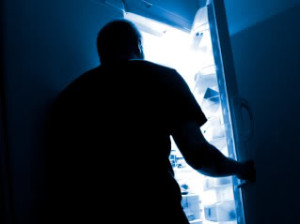- Calls to this hotline are currently being directed to Within Health or Eating Disorder Solutions
- Representatives are standing by 24/7 to help answer your questions
- All calls are confidential and HIPAA compliant
- There is no obligation or cost to call
- Eating Disorder Hope does not receive any commissions or fees dependent upon which provider you select
- Additional treatment providers are located on our directory or samhsa.gov
BED versus Overeating: How Can I Tell?

Contributor: Rita, Ekelman, MBA, RDN, LDN, Director of Nutrition Services at Timberline Knolls Residential Treatment Center

Overeating is something everyone has done at one time or another. Thanksgiving is a prime example; it is nearly a tradition to have seconds, or even thirds as part of the feast. Or at another time, perhaps an individual overeats simply because the food is irresistible: a colleague brought a homemade apple pie to work; a friend made her special once-a-year lasagna. The important aspect of simple overeating is that there is very little thought involved; either the body is responding to a physical need or the person just wants more of a good thing. Most important is that the activity is not planned.
BED is an Addiction

Perhaps the most significant marker regarding BED is the complete lack of control demonstrated by the individual. Once they begin to consume food, it is very difficult to stop. They eat far beyond the point of feeling full and way into the realm of physical pain.
Distinguishing between overeating and BED is not difficult. If you overeat on occasion simply because the occasion dictates, or the food is just so tasty, then you are just like the rest of the world. But if you binge more than once a week, the activity is planned, you do so in isolation, and consume food to the point of physical discomfort, then, you may be struggling with BED.
Although there is no reason to feel shame, there is every reason to get help. BED behaviors are very hard to break. However, with help from a qualified professional, a healthy relationship with food can be restored.
Community Discussion – Share your thoughts here!
Have you or your loved one struggled with binge eating disorder? When did you come to understand the difference between eating disorder and overeating? Has sharing this with others been challenging at times? What advice do you have to share with others?
The opinions and views of our guest contributors are shared to provide a broad perspective of eating disorders. These are not necessarily the views of Eating Disorder Hope, but an effort to offer a discussion of various issues by different concerned individuals. We at Eating Disorder Hope understand that eating disorders result from a combination of environmental and genetic factors. If you or a loved one are suffering from an eating disorder, please know that there is hope for you, and seek immediate professional help.
Last Updated & Reviewed By: Jacquelyn Ekern, MS, LPC on September 3, 2015. Published on EatingDisorderHope.com
